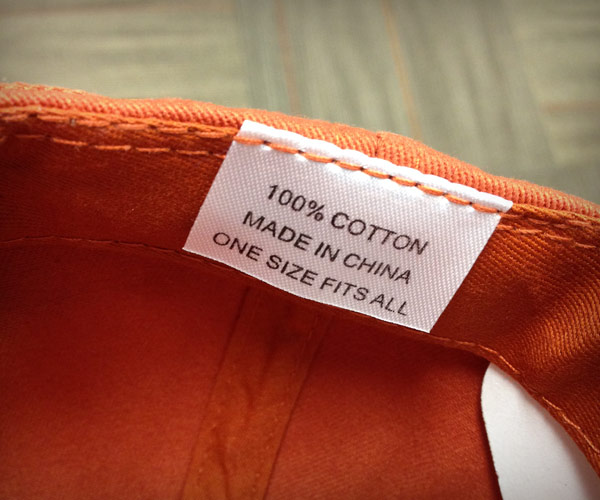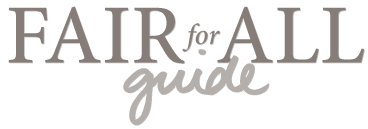
Over the years, I’ve defined a fairly rigorous ethical shopping process for my personal purchases. I do a lot of research into retailers’ labor practices; I look for used, recycled and made-in-USA options; and oftentimes I decide I don’t need what I’m shopping for at all. But I’ve realized that this process does not really carry over when I make purchases at work.
As a graphic designer, paper is one of the most common things I buy, and I do look for recycled and made-in-USA options. However, when it comes to other types of purchases, I tend to go with whatever my company has historically done. For example, my company has an event in May every year where we hand out baseball hats. This year the ordering of the hats fell to me, and I ordered them the same way we we’ve ordered them every year, which means they were custom-sewn in China.
There were many things I could have done to make sure our hat order was as ethical as possible:
- I could have asked our vendor what she knew about the factory where the hats are produced.
- I could have found pricing for hats made in the USA (though I had been informed that domestically-produced hats are much more expensive).
- I could have looked at the hat options on Ethix Merch, a site I’ve known about for years that specializes in ethical promotional items like pens and branded apparel.
Why didn’t I do any of these things? One reason is that it can be scary to challenge the status quo, especially if you are suggesting that your company’s current way of doing things is unethical. It gets even trickier when you can’t prove their practices are unethical, even if in your opinion it’s highly likely that they are. I can’t prove that the hats we order from China are made in a sweatshop. But even investigating it would raise eyebrows.
I’m betting that a lot of individuals care on a personal level about human rights and the environment but don’t take action through their jobs. Raising questions of ethics at work is definitely a risk and, depending on the company culture, could cost someone their job. I’ve seen friends struggle through long-term unemployment, so I find it hard to blame anyone for not speaking up. The question is: how do we start to make it OK for ethics to be part of conversations and decisions in the workplace? What positive change could we realize if it wasn’t a risk for people to ask challenging questions?
We need to shift to a culture where the ethics of a decision or purchase can be weighed equally alongside other factors like cost and quality. Will the most ethical choice always win? Nope. But sometimes it would, and just having that conversation gives people permission to really think about the ethics and values of their decisions.
Have you experienced anything like this at your job? Do you find it difficult to live your values at work?

I sat down with the HR rep at my old job to ask if we could prioritize made in USA and fair trade t-shirt brands (it was a screenprinting company) and she just nodded her head and said, “no, we can’t get rid of the big brands that people know and love, but we can continue to offer made in USA option for customers who care about that sort of thing.” It was a big blow for me. It made me realize that the more ethical options we carried were purely a way to diversify our products for a wider array of customers. It was business without a real backbone. It kills me that customer service oriented companies are all about taking care of the customer and US employees, but very rarely mention or consider the people they purchase raw materials from.
It’s really difficult for me to work, well, almost anywhere because I can’t get behind a company if I can’t get behind their sourcing. For now, I’m working at a fair trade, organic, family-owned coffee shop and I feel much better, but obviously we need conscientious consumers in every company who can quietly and persistently strive for change.
That experience definitely sounds demoralizing. I also have a hard time understanding the attitude of serving only your customers and US employees without even thinking about the other people involved in your supply chain. I’m glad you’ve found a place to work that you feel good about!
I’m in a really unique situation because I’m self-employed. I’ve always tried to get at least some of my products from manufacturers in the US. It meant paying more, but I felt like it was worth it in more than one way. Not only was I getting jewelry parts that were made safely and ethically, but I found that most of the time those products were higher quality, too.
Now that I’m starting things in interior design, I’m using fabrics that are printed in the US. I haven’t dug around to see if the the fabrics are woven here, but knowing that at least half of the process takes place in North Carolina makes me feel better. Like you said, it might not be feasible to be all ethical all the time, but a lot of people taking small steps will start to add up and hopefully make the bigger leaps easier.
It’s great that you shared your story…my company is sooooo big it’s really hard to like reach something as big as merch for us, but I have tried doing small things like when our assistant orders office supplies I will pick options made in the USA and recycled…she ALWAYS kicks back that they’re more expensive but I tell her I’ll bring in my own if it doesn’t get approved.
I don’t think it has to be taboo to suggest a more ethical option. Maybe framing the argument in a way that is positive like opposed to oh this bag is more ethical…saying something like we could be supporting jobs in the USA our clients would love that we do this. I don’t really know how effective it would be but at least it would temper the conversation a little.
I agree that this is so, so hard! I worked for an anti-trafficking non profit that ran a little boutique on the side that sold items made by survivors of sex trafficking…. and also big, gaudy, faux-leather-made-in-china purses that were sold to us at really, really low wholesale prices by a lady who had been a long-time supporter of the non-profit and ran her own little accessories boutique. I fought for two years to remove those purses from our product offerings, but was always told “but we make really good money off of those” and “people love them”. It really all comes down to the money!!